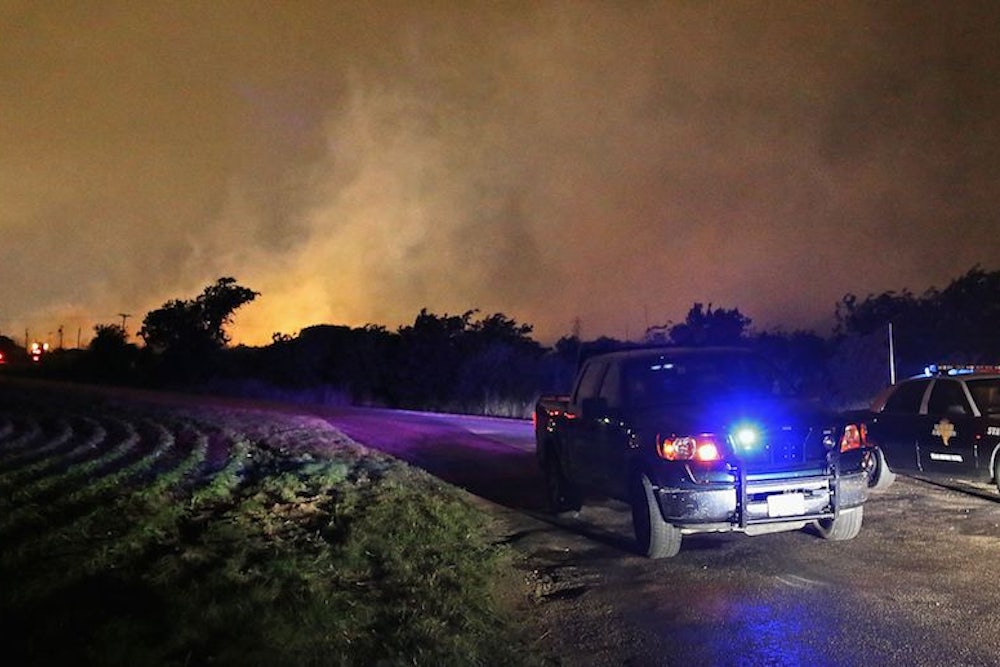You can see pretty much all of West, Texas, from I-35, which connects the town—which is not in western Texas, but the heart of the state—to Dallas in the north and Waco just south. A collection of only 2,674 people, according to the Census Bureau, West was famed—until this week—rather modestly for pretty great kolaches, sweet pastries filled with meat, cheese or fruit, and its Czech immigrant farming heritage. Every year, the town hosts a festival celebrating its Czech heritage—and proving that in Texas no good pun goes unpunished, there has even been a motel known, yes, as the Czech Inn.
Today, the day after a deadly fertilizer plant explosion killed as many as 15 people and injured around 160, the Czech Inn is at 100 percent occupancy—but full of people who live within less than the two-mile radius that encompasses all of West. The hotel itself had some glass blown out but didn’t sustain any major damage. “We’re doing everything we can,” says Joey Oliver, who is working the front desk. Not only is the hotel full but the phone never stops ringing with offers of help in the form of paying for rooms. The calls came from not just all over Texas but all over the country. But nobody knows, either, when they can go home.
Oliver himself is okay. Most of his family, he explains, lived on the opposite side of town from the blast. One member of his family, a 90-year old man, had his roof caved in by the explosion but miraculously escaped with bruises, scratches and a concussion. Asked what it was like to endure the night before, Oliver sighs briefly but heavily. “I couldn’t even begin to describe it,” he says. “This is just a small town. It’s something we never expected to happen.”
A memorial service was held in Boston earlier today for the victims of the marathon bombing. I tried listening, but had to switch it off. The speakers were sincere and moving, to be sure, but already the conversation has shifted to tales of bravery and recovery, promises of perseverance and resilience—polished words in stark contrast to the disorder and disbelief in that city earlier this week. It seems, frankly, rushed: No doubt many of the 170 people injured in the bombing—to say nothing of the friends and family of the dead—are still in disbelief, their lives very much in disorder.
In West, those comforting narratives have not yet come. Everything is still raw. As the Waco Tribune-Herald says about a vigil at Baylor University, down the road: “Baylor University students did what little they could to offer support Thursday morning.” The paper also notes that the same plant was the cause of a school evacuation recently. Michael Maler, 49, lost his home, says he knows some of the dead, and sums it up by telling the paper, simply: “West will never be the same.”
And that’s the point, really. You are never the same when you are touched by tragedy and loss. We use words like "perseverance" in inexplicable times like these—and in all the inexplicable, private tragedies and losses. And yet they seem like stones worn too smooth by a rushing river. Our feet cannot get a grip on them, get some traction, to cross the river. All that people can do is be with the thing that has suddenly come, that is suddenly not just present but omnipresent, with all the crushing absence it has suddenly and cruelly imposed.
“No one ever told me that grief felt so like fear. I am not afraid, but the sensation is like being afraid. The same fluttering in the stomach, the same restlessness, the yawning. I keep on swallowing,” C.S. Lewis wrote in A Grief Observed, upon the death of his beloved wife. “At other times it feels like being mildly drunk, or concussed. There is a sort of invisible blanket between the world and me. I find it hard to take in what anyone says. Or perhaps, hard to want to take it in. It is so uninteresting.”
Of course, I am committing the same error, or sin, I realize: spilling words upon a page. But I don’t delude myself in thinking that anyone in Boston or West or anywhere in states of shock, horror, or grief will take any solace from my words, nor should they. Perhaps those of us who have been spared those experiences—but know or don’t yet know our own private grief—can sense what it may be like from these words. Or not.
It's cold in West today, by Texas standards, barely cracking 50 degrees on a day that was supposed to be in the 70s. But, of course, today is not just another day. Back in Austin, where it's only slightly warmer, I cross the Lamar Street bridge over the Colorado River. Taggers love to spray graffiti on the railway bridge that runs parallel. I notice a graffito I have not seen before. Maybe it was always there, maybe it's fresh. Painted in orange are words that have no heroes or villains, no clumsy solace: “Never give up.”
